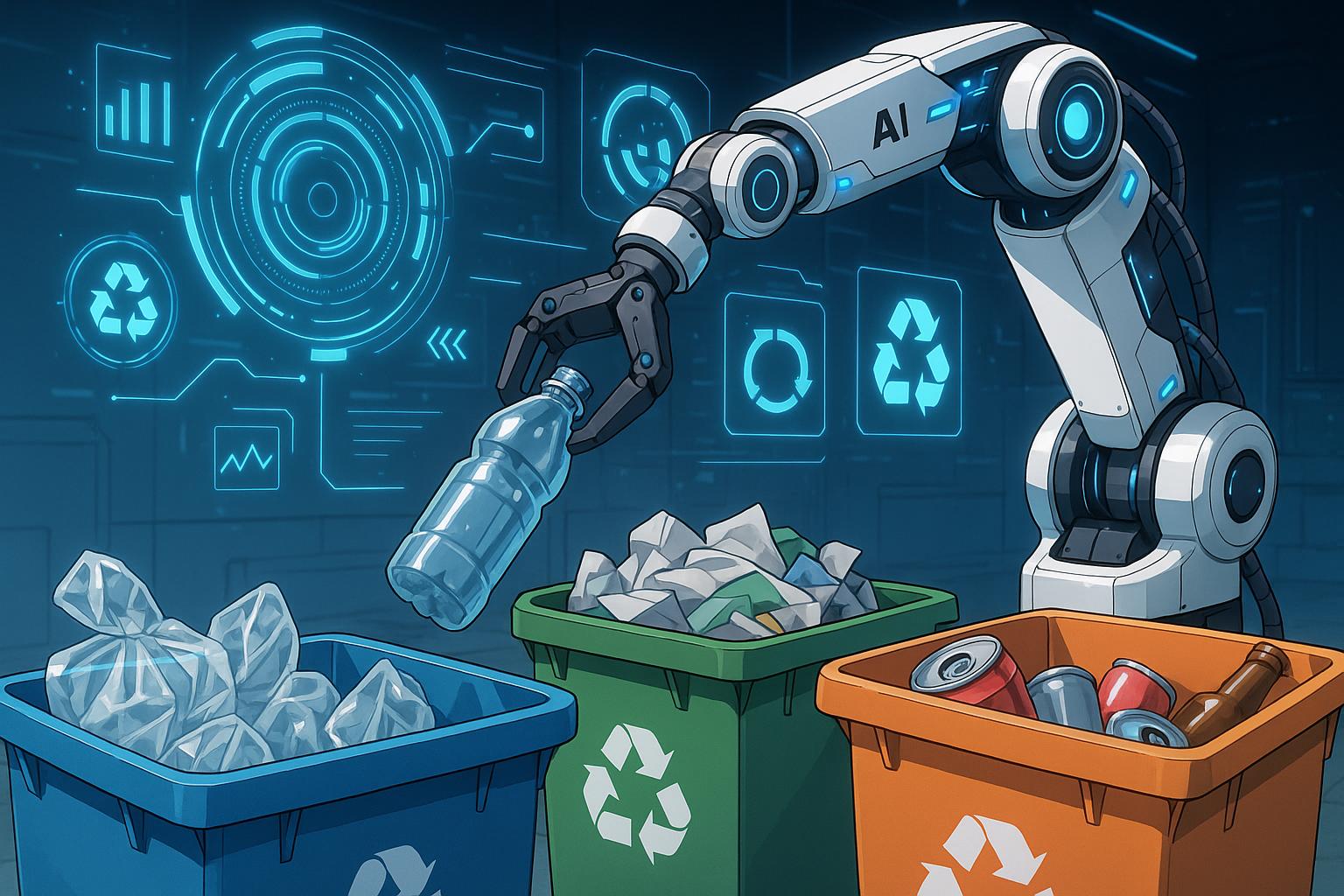Emerging AI technologies are transforming waste management by enhancing recycling accuracy, reducing food waste through smarter supply chains, and empowering consumers and policymakers with real-time data to foster sustainable practices and optimise urban waste systems.
As environmental concerns continue to escalate, the role of artificial intelligence (AI) in waste management is becoming increasingly prominent. Waste, in its myriad forms, poses significant challenges—clogging ecosystems, overwhelming landfills, and accelerating greenhouse gas emissions. In this context, AI is emerging not merely as a technological novelty, but as a vital partner in advancing sustainable practices.
With its inherent ability to analyse vast data sets and discern patterns, AI is transforming our approach to waste management across various sectors. From smart bins in urban centres to sophisticated algorithms fine-tuning supply chains, AI is operating quietly yet powerfully in the background.
The urgent need for innovative waste solutions has prompted businesses, governments, and individuals to adopt AI technologies. As the integration of AI into waste reduction strategies becomes essential, the prospects for sustainable management look increasingly optimistic.
Enhancing Sorting and Recycling
One of AI’s most significant contributions lies in boosting the efficiency and accuracy of recycling processes. Historically, recycling has depended heavily on manual sorting, a method fraught with inefficiencies. AI-driven robotic systems are now being introduced to transform this landscape. These robots, equipped with advanced machine learning and computer vision technologies, can swiftly distinguish and separate recyclable materials from waste.
For instance, companies like AMP Robotics and ZenRobotics have developed intelligent systems capable of identifying various plastics, metals, and paper materials at speeds and accuracy levels that far exceed human capabilities. This advancement not only enhances the quality of recyclables but also reduces contamination, thus improving the economic viability of recycling operations.
In addition to robotics, AI-powered optical sorters are being deployed to further refine recycling. These systems can scan and make real-time decisions about waste items, significantly diminishing the amount sent to landfills while ensuring valuable materials are recovered and reintegrated into production cycles.
Streamlining Supply Chains to Reduce Waste
The challenge of waste often begins well before products reach consumers. Inefficiencies in production and logistics significantly contribute to global waste. Here, AI has a transformative role, enhancing forecasts of demand and managing inventory levels. Retailers and manufacturers are increasingly using AI algorithms to scrutinise consumer behaviours and trends, including seasonal changes and external factors like weather fluctuations.
These insights allow companies to produce and stock products in more precise quantities, thereby minimising spoilage and unsold goods. Particularly in the food industry, where waste is a pervasive issue, AI assists in tracking product freshness and optimising logistics. Supermarkets have begun leveraging AI to predict the shelf life of products, recommending markdowns before items expire, which contributes to reducing the shockingly high volumes of edible food discarded each day.
Moreover, AI-driven logistics platforms can optimise delivery routes, effectively cutting down on fuel consumption and emissions. In this way, aligning supply more closely with demand not only curtails costs but also significantly diminishes environmental footprints.
Empowering Consumers and Policymakers
Although much of AI’s influence on waste reduction happens behind the scenes, its capacity to change consumer habits and inform public policy is equally crucial. Smart waste monitoring systems are making their way into homes, offices, and municipalities, providing real-time feedback on waste generation and recycling patterns. These technologies can alert users when bins are at capacity, track disposal habits, and offer suggestions for improved waste management.
Cities across the globe are employing AI to enhance urban waste management. By analysing data collected from smart bins and GPS-enabled waste collection vehicles, municipalities can optimise collection schedules and prevent overflowing bins, ultimately reducing fuel use and enhancing sanitation.
AI is also proving invaluable for regulators and policymakers, monitoring illegal waste dumping and assessing landfill expansion through advanced data analytics. Such capabilities enable authorities to design more effective interventions, enforce regulations, and evaluate the impact of their waste management strategies with greater accuracy.
Furthermore, public engagement with sustainable practices is being encouraged through AI applications. These tools help users sort waste accurately and locate nearby recycling centres or zero-waste shops, even gamifying the process to promote sustainable habits through community challenges and incentives.
Towards a Sustainable Future
The potential for AI to drive waste reduction is enormous, yet its implementation raises important ethical considerations. Concerns surrounding data privacy, the threat of job loss, and the digital divide must be addressed to ensure that AI benefits all sectors of society equitably.
Collaboration is paramount for success. By fostering partnerships between governments, technological innovators, environmental organisations, and local communities, stakeholders can develop AI systems that are as socially responsible as they are technically advanced.
As AI technology continues to expand, its influence on shaping a circular economy will only deepen. By transforming waste into a resource, optimising systems, and facilitating smarter choices, AI has the potential to reshape our understanding of waste from an unavoidable byproduct to a manageable challenge—one that can be effectively tackled through innovation and intelligence.
Reference Map
- Coverage on AI’s role in waste management and recycling enhancements
- Insights into AI facilitating a circular economy
- Details on AI-powered robotics improving recycling efficiency
- Profile of AI applications addressing food waste reduction
- Introduction of consumer-facing AI tools for waste sorting
- Mention of technological advancements reducing food waste
- Overview of AI’s impact on waste management and collection automation
Source: Noah Wire Services
- https://www.packaging-gateway.com/features/ai-in-waste-reduction/ – Please view link – unable to able to access data
- https://www.reuters.com/sustainability/society-equity/comment-how-ai-can-help-us-turn-our-disposable-economy-into-circular-one-2024-07-02/ – This article discusses how AI can facilitate the transition to a circular economy by optimizing business models, improving infrastructure, and enhancing recycling processes. It highlights AI’s role in directing sorting robots in recycling facilities and powering platforms like Plastic Bank, which incentivize recycling through trade. The piece also addresses concerns about AI contributing to e-waste and emphasizes the need for designing products for longevity and recyclability. Collaboration between human ingenuity and AI is deemed essential for driving sustainable changes.
- https://www.axios.com/2023/04/04/recycling-robots-ai-landfill – The article explores the integration of AI-powered robots in the U.S. recycling industry, focusing on their ability to sort trash more efficiently and safely than humans. These robots utilize artificial intelligence to gather valuable data about waste, aiming to tackle issues like the rise of hard-to-recycle plastic and contaminated recycling streams caused by consumer mistakes. The piece also discusses the potential of automation to address labor shortages in recycling facilities and improve the economics of recycling.
- https://time.com/6103206/rayner-loi-next-generation-leaders/ – This piece profiles Rayner Loi, founder of Lumitics, who is addressing food waste through AI-powered garbage cans equipped with weight sensors and cameras. These devices track and identify food waste in commercial settings such as hotels and airlines, helping establishments monitor and reduce avoidable food waste. The technology allows chefs and managers to adjust food preparations, reducing waste and improving profit margins. The article also highlights Lumitics’ expansion beyond Singapore to other parts of Asia.
- https://www.axios.com/2023/06/05/ai-recycling-garbage-sorting-trash-oscar-intuitive – The article introduces Oscar, an AI-driven system developed by Canadian startup Intuitive AI, designed to help people sort their trash correctly by scanning items and determining if they are recyclable or compostable. This innovation addresses the significant issue of ‘consumer error’ in recycling, which contributes to low recycling rates. The piece also mentions other initiatives, such as adding QR codes to food packaging and using AI-powered trash-sorting robots in recycling centers, to improve recycling practices.
- https://apnews.com/article/0d0e84044c3d5218b10dc032cd2ff3c4 – At CES 2023, startups unveiled technologies aimed at reducing global food waste. Dutch entrepreneur Marco Snikkers introduced OneThird’s avocado scanner that uses optical sensing and AI to determine ripeness, aiming to reduce food waste and CO2 emissions. OneThird works with growers and distributors and is testing the scanner in a Canadian supermarket. Another startup, Orbisk, employs a camera system in restaurant kitchens to monitor food being thrown away, providing patterns to help reduce waste.
- https://aiforgood.itu.int/revolutionizing-waste-management-the-role-of-ai-in-building-sustainable-practices/ – This article discusses the role of AI in revolutionizing waste management by enhancing sorting accuracy, optimizing collection routes, and automating waste processing. It highlights the use of machine learning algorithms for waste sorting, predictive analytics for collection optimization, and AI-powered robotics for processing tasks. The piece also mentions AI-powered sensors integrated with the Internet of Things (IoT) to optimize waste collection by tracking the fill levels of waste bins and determining the need for collection.
Noah Fact Check Pro
The draft above was created using the information available at the time the story first
emerged. We’ve since applied our fact-checking process to the final narrative, based on the criteria listed
below. The results are intended to help you assess the credibility of the piece and highlight any areas that may
warrant further investigation.
Freshness check
Score:
8
Notes:
The narrative discusses ongoing and evolving applications of AI in waste management without referencing outdated figures or personnel; technologies named (e.g., AMP Robotics, ZenRobotics) and applications are current as of recent years. No direct indication that the content is recycled from older, outdated material; however, specific dates or timestamps for new developments are absent, keeping some uncertainty about absolute recency.
Quotes check
Score:
10
Notes:
There are no direct quotes included in the narrative, so no need to verify or locate earliest references. This absence improves the originality and reduces risk of quote misattribution.
Source reliability
Score:
7
Notes:
The narrative originates from Packaging Gateway, a specialised industry publication focused on packaging and related technologies. Such sector-specific outlets are generally reliable for technological and industry insight but are less authoritative than major international news organisations. The lack of explicit citation of primary research or peer-reviewed studies limits full reliability.
Plausability check
Score:
9
Notes:
The claims about AI applications in waste sorting, supply chain optimisation, consumer engagement, and policymaker tools align well with known recent technological trends and documented use cases. Mentioned companies and described AI capabilities correspond with existing industry practices. Ethical concerns and collaborative approaches discussed are plausible and consistent with broader AI deployment challenges.
Overall assessment
Verdict (FAIL, OPEN, PASS): PASS
Confidence (LOW, MEDIUM, HIGH): HIGH
Summary:
The narrative provides a timely and plausible overview of AI’s expanding role in waste reduction, with accurate descriptions of current technologies and applications. No outdated information or recycled content is evident, and no direct quotes require verification. While the originating platform is specialised rather than a globally renowned news organisation, it remains a credible source for this topic. The claims are consistent with known developments, supporting a high confidence in the narrative’s accuracy and freshness.













